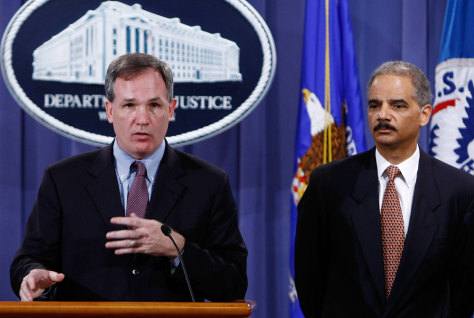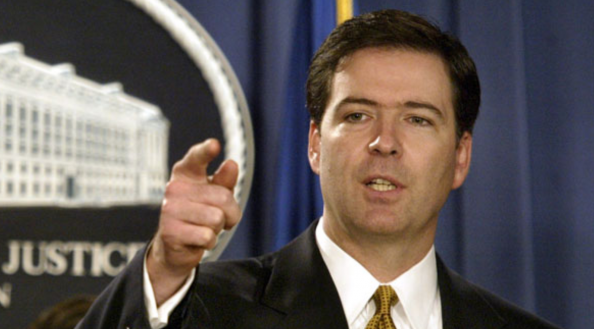Scooter Libby’s attorneys might be forced to “Win”
Ernie Souchak, Editor-in-Chief
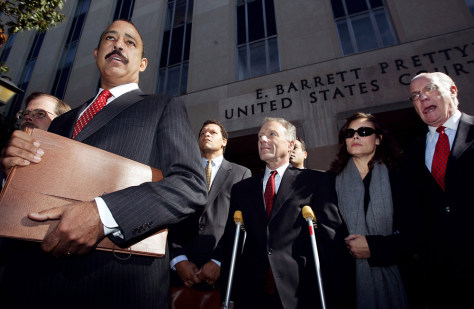
Lewis Libby, center, listens to his lawyer Ted Wells, left, speak to reporters outside federal court after his arraignment hearing in Washington, D.C. Also pictured are Libby's wife Harriet and lawyer Joseph Tate.
The attorneys assembled to form the "legal team" that defended Lewis "Scooter" Libby, in the case
U.S. v Libby, apparently have a dilemma.
Scooter Libby's attorneys might be forced to win the case for their client.
The email communication below, contains a possible explanation as to why Libby's attorneys have not yet demanded justice for their client Scooter Libby.
From: (redacted)
To: ted wells
Sent: October 6, 2013 at 4:03 PM
Subject: How about you
Mr. Theodore Wells
What is your dilemma?
(name redacted)
-----Original Message-----
From: (redacted)
To: joseph tate
Sent:October 5, 2013 at 4:15 PM
Subject: You have a decision to make.
Mr. Joseph Tate
The fact that you and your firm Dechert LLP represented Lewis 'Scooter" Libby in U.S. v Libby puts you in a very per-carious situation due to recent developments.
As you can see from the Illinois Pay-to-Play article linked below, your client should never have been indicted much less ever brought to trial. And, as Libby's defense attorney in that case, it is incumbent on you to rectify this egregious misconduct on the part of the Dept. of Justice.
The dilemma for you and Dechert LLP is, if you honor your obligation to your client and your profession, your partner at the firm, Glenn Fine, may lose his license to practice law.
However, if you ignore your obligation to your client, you will lose the trust of those who have, and would consider hiring your firm, and you diminish your entire profession.
Perhaps, even exposing the firm to legal complications and liabilities.
Advance notice of your decision would be appreciated.
(name redacted)
DoJ Inspector General Glenn A. Fine complicit in fraud known as “Plamegate”
Officers of the court are required to report illegal and or un-ethical conduct. Not to mention the obligation they have to their client.
The conduct of the Dept of Justice in U.S. v Libby was both un-ethical and illegal.
So, no dilemma, officers. Just do what's required!
Oh, and could someone please wake up Inspector General Michael E. Horowitz. He needs to have a serious chat with the new FBI Director James B. Comey.
The Libby "legal team" aka officers of the court.
Theodore V. Wells
Paul, Weiss, Rifkind, Wharton & Garrison LLP
1285 Avenue of the Americas
New York, NY 10019-6064
William H. Jeffress
Baker Botts LLP
1299 Pennsylvania Ave., NW
Washington, D.C. 20004-2400
Joseph A. Tate
Dechert LLP
2929 Arch Street
Philadelphia, PA 19104-2808
John D. Cline
235 Montgomery Street, Suite 1070
San Francisco, California 94104
U.S. Attorney’s office protected Rezko friend Dr. Ronald Michael
Ernie Souchak, Editor-in-Chief

Assistant U.S. Attorney (AUSA) Carolyn McNiven was the attorney-of-record in the government's case against Obama friend and fundraiser, Antoin "Tony" Rezko.
McNiven was also lead attorney in the government's case against Rezko's partner in the enterprise called Companion Security, Daniel T. Frawley. It was a venture designed to, allegedly, train, in the U.S., Iraqi security workers for the Iraqi Ministry of Electricity.
At IP2P we've also recently learned that Patrick Fitzgerald put McNiven in charge of suppressing evidence that Rezko friend and associate, Dr. Ronald Michael, committed multiple felonies.
One of those felonies was an act of fraud that involved the law firm Piper Rudnick, currently known as DLA Piper.
That's the same Piper Rudnick that:
(A) employs Obama's friend and backer, Peter Bynoe, as a senior partner;
(B) is aligned with The Cohen Group where Patrick Fitzgerald's star witness in the Valerie Plame investigation, Marc Grossman, is Vice Chairman; and
(C) was dealing with Rezko and Frawley pertaining to Companion Security's 50 million dollar Iraq security contract.
Isn't it interesting how the dots connect
Isn't it also interesting how the Chicago media serially ignores the dots?
---------- Forwarded message ----------
From: Dan Frawley<Address redacted>
To: Robert Cooley <Address redacted>
Date: Thu, Jun 2, 2011 at 12:54 PM
Subject: ROBERT NICHOLS IS THE PIPER RUDNICK ATTY WHO WENT TO JORDAN WITH ME. HE ALSO REPPED BILL COHEN'S (COHEN GROUP) & NOUR USA HUD FAROUKI GOOGLE THEM
And, as luck would have it, the same DLA Piper/Piper Rudnick that made Carolyn McNiven a full partner when she left the U.S. Attorney's office. Imagine that.
PRESS RELEASE
Carolyn McNiven joins Litigation practice in San Francisco
----- Forwarded Message -----
From: (Redacted)
To: carolyn.mcniven@usdoj.gov
Sent:Tue May 11, 2010
Subject: Follow up on our meeting
Carolyn
Let me know when you are available to finish our conversation about Dr. Ronald Michael being on the Terrorist watch list, and the circumstances that led him to send Paul Dubuque to Jordan on his behalf. Dr Michael's involvement with Tony Rezko and the contracts that came out of Iraq will need to be disclosed. It is starting to appear unlikely that your office is going to proceed to trial against Rod Blagojevich this June, making the truth of John Thomas even more important than ever. I look forward to our follow up.
(name redacted)
The most disturbing aspect of Assitant U.S. Attorney Carolyn McNiven suppressing evidence of crimes committed.
It nearly cost someone their life.
Coming soon....Marc Grossman, The Cohen Group, DLA Piper
The Valerie Plame case: The man who was appointed to appoint Patrick Fitzgerald “Special Counsel”
Thomas Barton, Investigative Reporter
U.S. Attorney James B. Comey was appointed Deputy Attorney General for the purpose of appointing U.S. Attorney Patrick Fitzgerald as "Special Counsel" to lead the investigation into who "leaked" Valerie Plame's identity as a C.I.A. employee to the press. It was all choreographed.
It was known that Deputy Secretary of State Richard Armitage leaked Plame's identity as a CIA employee to the press - even before Patrick Fitzgerald was appointed "Special Counsel". Go figure.
And, it was known that Armitage was the "Leaker" before Comey was chosen for his job, and before he appointed Patrick Fitzgerald as "Special Counsel," and before Fitzgerald was tasked to find out what the government already knew.
Seriously, you can't make this stuff up! Here's a sequence of key dates:
Oct 1, 2003: Bob Novak published an article that causes Richard Armitage to go immediately to the FBI and confess to being the "Leaker" in the Valerie Plame case.
Oct. 3, 2003: George W. Bush nominates Patrick Fitzgerald's peer and close friend, U.S Attorney James B. Comey, to be Deputy Attorney General.
Oct. 29, 2003: During Comey's senate confirmation hearing, Senator Chuck Schumer (D-NY) questions Comey about the possibility of Attorney General John Ashcroft recusing himself in the Plame case and Comey appointing a Special Counsel to that case.
So, what happened next?
Comey was confirmed Deputy Attorney General.
Ashcroft recused himself, putting Comey in charge of the Plame case.
Comey appointed his close friend, Patrick Fitzgerald as Special Counsel in charge of finding the "Leaker".
And, this was all done after Armitage confessed to being the "Leaker," said he wouldn't seek legal representation, and claimed to be prepared to accept the consequences of his actions.
Fitzgerald asked Armitage to keep his guilt to himself.
Armitage complied.
Judith Miller went to jail, and Scooter Libby was prosecuted and found guilty...of something other than leaking.
Shortly after appointing Fitzgerald to the Plame case, Comey left the Attorney General's office to become lead counsel at Lockheed Martin. We'll explain the significance of that move later.
And where's Comey today? He's a partner and general counsel at Bridgewater Associates.
Stay tuned.....
The truth about the Valerie Plame case. (10 years later)
Hugo Floriani, Investigative Reporter
We're going into the final year of a decade since the Valerie Plame case burst into the national news, and still the truth remains untold by key persons involved. Why is that?

Is Richard Armitage telling the truth when he says he didn't tell President Bush that he was the leaker in the Valerie Plame case because of U.S Attorney Patrick Fitzgerald?
In an interview with CBS News national security correspondent David Martin, former Deputy Secretary of State Richard Armitage said he didn't come forward as the source of the leak because "the special counsel, once he was appointed, asked me not to discuss this and I honored his request".
Patrick Fitzgerald was appointed special counsel on December 30, 2003.
Let's examine Armitage's claims.
Armitage has stated that reporter Bob Novak's column, published October 1,2003, caused him to (1) immediately meet with the FBI and confess to being the leaker, and (2) then call Secretary of State Colin Powell and tell him he was Novak's source and, therefore, responsible for leaking the identity of Valerie Plame as a CIA employee.
According to court records Richard Armitage went to Marc Grossman, the Undersecretary of State, on the evening of October 16, 2003 and told Grossman that he, Armitage, was the leaker. Armitage did this knowing that Grossman was scheduled to be questioned by the FBI the next day.
Undersecretary Marc Grossman is the author of the memo that started it all by identifying who Valerie Plame was to his superiors at the State Department - Armitage and Powell.
So, what do we know?
(1) We know that as of Oct. 16, 2003 the top three officials at the State Department and the FBI knew that Richard Armitage was the person who divulged Valerie Plame's identity to the press.
(2) We know that, between Oct. 16 - Dec. 30, it was not Patrick Fitzgerald who was keeping the three top officials in the U.S. State Department from divulging that Armitage was the leaker.
And (3) we know, that, if in the time between Oct. 16 - Dec 30, any one of the State Departments top three officials (Powell, Armitage or Grossman) or the FBI would have gone public with what they knew, Patrick Fitzgerald would have never been appointed Special Counsel.
Consequently, New York Times reporter Judith Miller would not have spent nearly three months in jail, and Vice President Dick Cheney's Chief of Staff, Scooter Libby, would not have been prosecuted.
As this unfolds, ponder this:
Did our current FBI director Robert Mueller keep the identity of the "leaker" Richard Armitage from his boss, Attorney General John Ashcroft?
And, if not, did John Ashcroft neglect to tell President George W. Bush?
To be continued....
Patrick Fitzgerald and the Kabuki Dance of the Valerie Plame Thing
Hugo Floriani, Investigative Reporter

Why would James B. Comey appoint Patrick Fitzgerald as Special Counsel on a case that was already solved?
Why would he even appoint a Special Counsel at all when Richard Armitage, the man responsible for exposing the identity of CIA employee Valerie Plame to the media, had already confessed and had not even hired an attorney to represent him?
Who is James B. Comey?
_______________________________________________________________________________________
James B. Comey, Jr. (born December 14, 1960) was U.S.Deputy Attorney General in the George W. Bush's administration. As Deputy A.G., Comey was the second-highest ranking official in the Department of Justice (DOJ). He ran the day-to-day operations of the DoJ, serving in that office from December 2003-August 2005.
Comey had been U.S. Attorney for the Southern District of New York before becoming Deputy A.G.
In December 2003, he appointed his close friend and former colleague, U.S. Attorney Patrick Fitzgerald, to be the Special Counsel leading the investigation into the Valerie Plame leak after Attorney General John Ashcroft recused himself.
In August 2005, Comey left the DOJ and became General Counsel and Senior Vice President at Lockheed Martin. From there he went on to Bridgewater Associates in June 2010.
________________________________________________________________________________________
In 2009, Comey’s total compensation package at Lockheed Martin was 6,113,797. Apparently, no one in the media cared that Lockheed worked closely with the Cohen Group where Marc Grossman was Vice Chairman.
Grossman was a key figure in Patrick Fitzgerald's quest to find out who leaked that Valarie Plame worked for the CIA.
Before Fitzgerald’s investigation team even bought their office supplies, Comey and Fitz knew that Armitage had, innocently he claimed, leaked the knowledge about Valarie Plame to, now deceased, columnist Bob Novak.
Comey left Lockheed to work at Bridgewater Associates and then, after a short stay at Bridgewater, he became a partner with Attorney General Eric Holder's former law firm, Covington & Burling.
What do Lockheed Martin and the Cohen Group have in common? Did they have any vested interests in Iraq or Afghanistan while Fitzgerald was chasing down the phantom leaker? Did the old media ever explore that possibility?
Has any reporter ever asked Fitzgerald or Comey why a phantom leaker was sought after the real leaker had already confessed? Did any Tribune or Sun Times reporter ever pose that question to Fitz?
Has anyone asked former New York Times writer Judith Miller how she feels about having spent nearly three months in jail after Fitz already knew that Armitage was the leaker? Does that make her a victim of wrongful imprisonment?

What does Scooter Libby say about all this?
And, lastly, did Fitzgerald or Comey violate any laws during this Kabuki dance?
Many questions – no media interest – hence, no answers. Nothing to see here folks, move along. It’s the Chicago Way.
Next..... Where did Dick Armitage eventually land?
Chicago Tribune reporter John Chase talks about Rezko’s friend and sponsor
Ernie Souchak, Editor-in-Chief

Trib reporter John Chase knows much about Dr. Ronald Michael, the mystery man pictured with George W. Bush at a fundraiser sponsored by Antoin “Tony” Rezko.
Chase told a source that Tony Rezko lived with the Michael family when he came to Chicago from Lebanon as a young man. Chase said that Michael was involved with Rezko in securing reconstruction contracts in Iraq. And, that Michael was trying to get Federal and Illinois state funding for a project involving property he owned in Iraq.
When pressed for details, Chase would not disclose where the monies would come from, nor for what purposes they’d be granted.
Chase was also the first to confirm that the “John Doe” filed lawsuit against the Sun Times was filed by Dr. Ronald Michael. Furthermore, Chase confirmed that Michael threatened to sue Chase and the Trib if he, Chase, outed him as Mr. Doe.
Michael's threat worked.
John Chase, who has much to tell about the mystery man who, according to Chase, gave convicted felon Tony Rezko his start in Chicago, has never told Tribune readers what he knows.
Oh, did we mention that Michael was on the Blagojevich $25,000 Donor Clout List? And that Michael’s name also appeared on a list of possible appointees to the Illinois Health Planning Board with the initials “TR” next to it?
Michael was not appointed to the Planning Board, but his friends Dr. Fortunee Massuda, Dr. Michel Malek, and Dr. Imad Almanaseer were.
Michael followed the banking route instead, and that venture will cost the FDIC over $3,000,000. (Stand by, we’ll have more on the bank thing later.)
Why would someone who purports to be a "journalist and author" leave out such relevant, interesting and important information from his articles and book?
John, you saving the good stuff for a screenplay, or what?
Meanwhile, the Valarie Plame story is falling apart. Who will have the most interesting story there - once-jailed New York Times journalist Judith Miller, or John Chase?
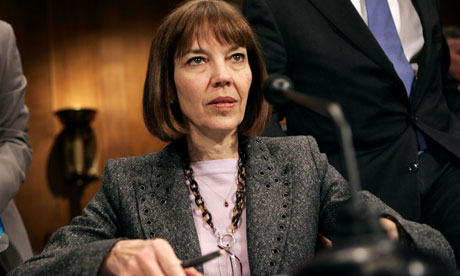
“Golden,” the whitewashing of a Department of Justice crime spree
Ernie Souchak, Editor-in-Chief, Illinois PayToPlay & Hugo Floriani, Investigative Reporter
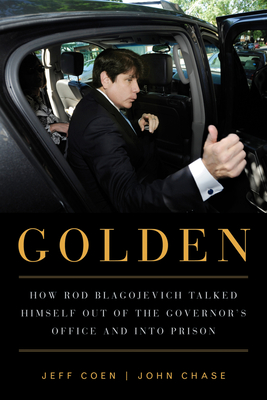
Chicago Tribune reporters Jeff Coen and John Chase wrote a 486-pages book that packs tedious and mundane details about former Illinois Governor Rod Blagojevich’s life, from birth to prison, around one key chapter that documents the role of former U.S. Attorney Patrick Fitzgerald in leaking information about his investigation of the ex-governor known nationwide as “Blago”.
The whitewash begins on the second page of the foreword entitled “Authors’ Note”: “We quote heavily from the recordings that federal agents made on phones used by the governor and others. All of those quotes come from transcripts of those phone conversations or the recordings themselves. We are grateful to those who provided case material that was outside of the public record.” (For ease of reading, we will italicize all quotations from the book.)
Those persons “who provided case material that was outside of the public record” remain unidentified throughout the book. But it soon becomes clear where they worked.
In an article written by Ernie Souchak posted on this website last September 14, we noted how the judge’s protective order, covering the transcripts of Blago’s phone conversations, stipulated that nothing prohibited Blago and his lawyers from telling his version of those recorded conversations. Blago and his attorneys were, though, ordered not to disseminate the transcripts that the feds gave them. Only the feds had permission to do that.
So, apparently, Coen/Chase secured those transcripts and recordings mentioned in the “Authors’ Note” from the feds. Here’s a question: Why was the information given to them?
Hold that thought.
The problem for the book’s core narrative – the arrest, trial and conviction of Blago – unfolds in Chapter 14 (pp. 257-295) entitled “I’ve got this thing…”
Background
On October 16, 2011, we concluded a ten-article series concerning U.S. Attorney Patrick Fitzgerald, which first posted here in on September 19, 2011, with this summary:
“So, what are the facts and circumstances that we know that collectively tend to prove, or sustain by their consistency…the hypothesis that Patrick Fitzgerald is a politically-driven, not jurisprudence-driven, prosecutor whose image as an intrepid, unbiased crime fighter is a media-created fabrication?
Here are a few headlines from Parts 1-9:
Fitzgerald acknowledged that someone leaked information to the Chicago Tribune, via a reporter for the Chicago Tribune, while the reporter, John Chase, sat mute in the front row of the news conference where the arrest of Blago was described as an effort to stop a crime spree. (Chase has told a source known to this writer that he would not identify who leaked him the information on First Amendment grounds.)
In fact, (1) Blago’s crime spree had, with Fitzgerald’s knowledge, been going on for several years. (2) Chase has not been called to account for tipping off Blago that his conversations were being recorded by the feds. (3) Eric Holder’s Department of Selective Justice has taken no steps – like that taken by Fitzgerald when he jailed Judith Miller of the New York Times in the Valerie Plame Case – to force Chase to reveal the source of the leak. And, (4) Fitz’s demeanor in discussing the leak in a press conference can be accurately described as disinterested.
The urgency to arrest Blago was manufactured out of whole cloth. The leak had to originate out of the DoJ. And, the closest outlet for the DoJ to the Chicago Tribune is Fitzgerald’s office. You connect the dots.
In retrospect, we know now that Richard Armitage was the confessed leaker in the Valerie Plame Case. We also know that Fitzgerald knew of Armitage’s confession before undertaking a long and costly investigation that convicted a key staff member of Vice President Cheney of a crime not connected to the Plame leak. And, that this media event, upon which the foundation of the Untouchable myth was built by the main stream media, was politically-driven.
The Plame “investigation” boiled down to a surrogate WWF-like wrestling match between two Big Beltway Boys: Armitage representing Powell – Libby for Cheney. With Fitzgerald as the biased referee. And, it will be so chronicled by unbiased historians in the future.
The arrest of Blago was timed, not to stop a crime spree, or the selling of a Senate seat – since the latter notion is built on the myth that, once Blago got paid for appointing someone, the act was immediate and irrevocable. The arrest was timed to save Congressmen Jesse Jackson, Jr., from criminal prosecution for bribing a governor in order to receive a Senate appointment. Connect the dots. It was about saving J.J., Junior.”
Chapter 14 – The Whitewash
The narrative here is significant, not just for what it reveals, but more for what it conceals.
The authors do not reveal the source for the information that Chase telephonically conveyed to Blago’s Spokesman, Lucio Guerrero, at approximately 10:30 p.m., Friday, December 4, 2008, namely, that the feds were listening in on Blago’s phone conversations.
Consequently, this question remains unanswered: Who leaked the information that Blago’s phone conversations were being wiretapped by the feds to the Tribune and Chase? Plus, why was that revelation leaked to the paper?
Then, why did Fitzgerald show no interest in tracking down the leaker?
We’re no closer today to answers to those questions after the 486 pages of whitewash.
Now, for the information in Chapter 14 that substantiates our October 2011 summary above:
Page 264: “Again, prosecutors noted the gravity of what Blagojevich had said. They were aware of the Balanoff meeting but had not recorded it.” (Tom Balanoff is president of the Service Employees International Union, Illinois Council, and the Vice President of its International Executive Board.)
How did the Coen/Chase know this information unless someone in the U.S. Attorney’s office gave them a blow-by-blow description of the investigation? Of course that’s what happened. The authors were scripted by the feds.
Page 267: “At the FBI’s listening room, there continued to be a mixture of thrilled disbelief and newfound resolve at what was being caught on the recordings. Agents believed they were capturing the sitting governor in incriminating conversations, and they played the calls for supervisors.
At one point, the FBI’s national director, Robert Mueller, was in town for a Chicago event. Having heard about the success of the Blagojevich operation, Mueller wanted to hear some of the recordings for himself. He stopped at the FBI’s Chicago headquarters on Roosevelt Road on the West Side near Ogden Avenue and took a seat in Rob Grant’s office. Agents had put together a disc of some of their favorite snippets for Mueller to hear.
Who was the guy dropping the F-Bombs? Mueller asked.
Well, that was the governor of Illinois, agents explained.
“You’ve got to be kidding me,” Mueller said, shaking his head, clearly pleased with how investigators were doing.”
This sounds like the testimony of an eyewitness to the event, given all the illustrative details. That eyewitness would be an employee of the FBI, or, someone from Fitzgerald’s office involved in the USAO’s investigation of Blago. This information clearly didn’t come from an audio tape or transcript of one of Blago’s intercepted calls, or from the building’s janitor.
It comes from a source intimately involved in the investigation.
Page 281: This portion of Chapter 14 explains the nature of the alleged urgency that caused the USAO to arrest Blago to, as Fitzgerald later claimed, stop an on-going crime spree.
“Fitzgerald had grown concerned that they had a sitting governor who had yet to make an appointment after working for weeks to see what he could get for himself in a deal for the Senate seat. They could let things go a little further, but it was starting to get risky that Blagojevichwould actually make a choice. Schar [Reid Schar, an Assistant U.S. Attorney, NDIL] said it would be derelict of those in the room to allow Blagojevich to make a decision. Everyone in the meeting believed the process had been corrupted, no matter how Blagojevich finally acted. To do something before he made a pick and out the investigation would at least make that corruption known, and the political could react to any pick by the governor.
In the end, there was agreement. Very soon, they would act, and likely on the morning of December 9, a Tuesday, the day before Blagojevich’s birthday and after a possible meeting the governor had been talking about with Jesse Jackson, Jr.”
What does “at least make that corruption known” mean? The USAO had been investigating Blago for years, and had compiled a substantial amount of evidence of corruption. At least, the goal should have been to arrest Blago when he accepted a bribe, and, also, arrest whoever paidthe bribe.
The real “risk” in letting Blago close a deal with the briber(s) negotiating with him on behalf of Jesse Jackson, Jr., was that they, too, would be implicated in a crime along with Blago. Whatever happened to the notion of intent to commit a crime? Blago went to jail – the briber(s) skated. That was the goal.
Pages 286-288: “’Jackson was the ‘uber African American,’ Blagojevich reminded Harris. He would consider what it would mean in black politics and how it would strengthen him, Blagojevich said, and don’t forget, third parties had offered him $1.5 million in fund-raising help.” (p. 286)
“’There’s tangible, concrete, tangible stuff from [Jackson’s] supporters,’ Blagojevich said, as Yang [Fred Yang, a pollster hired by Blagojevich] pressed him for more detail. ‘Well like, you know. You know what I’m talking about,’ the governor finally told him. ‘Specific amounts and everything.’” (p. 287)
“When prosecutors heard Blagojevich make the ‘tangible’ remark, they believed the Jackson proposal was in fact the way the governor was going to go.” (p. 288)
So, according to Coen/Chase, the feds believed that Blago was about to do a deal that would yield him $1.5 million for appointing Jesse Jackson, Jr. as a U.S. Senator from Illinois. That means that Blago was arrested to stop the commission of a specific crime, rather than to stop a crime spree.
If the USAO would have waited, both the bribee and the briber would have been caught and prosecuted. But the trap was sprung prematurely – for a reason.
Robert Blagojevich had a meeting scheduled with Jackson's money man Raghuveer Nayak on Friday, December 5. After learning from Chase, on the evening of December 4, that his conversations were being intercepted by the feds, Blago instructed his brother Robert to cancel that meeting.
The Duck Rule
If it looks like a duck; waddles like a duck; and quacks like a duck – face it, it’s a duck.
As we wrote back in October 2011: “The arrest was timed to save Congressmen Jesse Jackson, Jr. from criminal prosecution for bribing a governor in order to receive a Senate appointment. Connect the dots. It was about saving J.J., Junior.”
Remember that Jackson was the ’08 Co-chair of Obama’s Presidential Campaign Committee.
Conclusion
The book entitled Golden, written by two Chicago Tribune reporters who were granted special access to information coming from inside the investigation, is a 486-page apologia in defense of an improbable explanation behind the timing of the arrest of former Illinois Governor Rod Blagojevich.
It is a duck.
Was there a quid pro quo deal here? Did the USAO inside-leaker(s) say, “Guys, we’ll give you exclusive access to all this information, and in exchange you tell the story the way we want it told. We gotta deal?”
Don’t forget that Roland Burris, the man Blago appointed to the U.S. Senate, was the 60th vote in favor of ObamaCare. Had Blago, and those bribing him, both been arrested after the money was exchanged, would there have even been a second Senator from Illinois in the U.S. Senate when the ObamaCare vote was taken?



